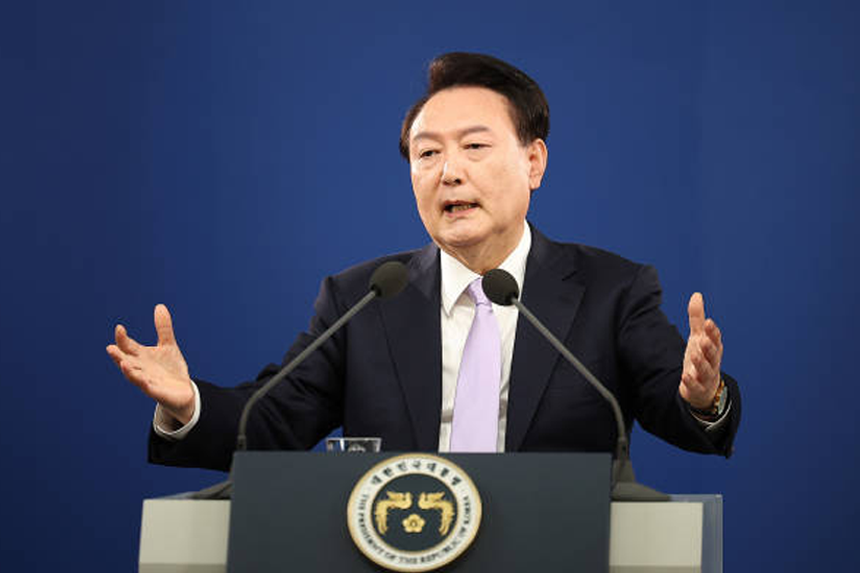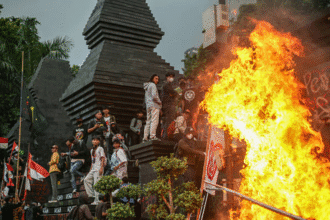Declaring it an act like a military coup and accusing South Korean President Yoon Suk Yeol of trying to create a “fascist dictatorship,” North Korea has severely denounced his recent effort to implement martial law.
This represents the most recent turn in the continuous political turmoil engulfing South Korea, where Yoon’s political future is now in doubt.
Last week, Yoon shockingly declared martial law in reaction to alleged threats to his presidency and accused North Korean sympathizers of subverting his government.
His attempt to impose such severe policies failed, which resulted in mass demonstrations and mounting calls for his resignation.
North Korea's response to Yoon's actions?
An item in North Korea’s state-run daily Rodong Sinmun attacked Yoon’s conduct as evidence of “desperation” and a dangerous path toward authoritarianism. “Yoon’s insane act is akin to the coup d’état of the decades-ago military dictatorship era,” the paper said.
It also noted that Yoon had “brazenly brandished blades and guns of fascist dictatorship at his people.” The article’s tone was hostile, charging Yoon for betraying the people he was supposed to serve.
Under Kim Jong Un, a man sometimes regarded as a dictator by the world community, North Korea has long criticized the government of South Korea. Rodong Sinmun said in its editorial that the proclamation of martial law revealed flaws in South Korean society. “Yoon’s sudden martial law declaration is an expression of desperation, and it shows that Yoon’s political life can end early,” the paper said.
What part did demonstrations play in the political crisis of South Korea?
Protests breaking out in Seoul have intensified South Korea’s dilemma. The Rodong Sinmun paper highlighted images of these demonstrations, which included young South Koreans holding K-pop light sticks and banners. These protests mirror general discontent with Yoon’s handling of the matter and have further heightened political uncertainty.
Yoon’s brief effort to apply martial law has rocked South Korea and called into doubt his legitimacy. He has been forbidden from leaving the nation under investigation for treason while still in government. The precise extent of his residual power is unknown as his actions have split the country and cast doubt on its future leadership direction.
What Could Yoon's impeachment offer?
The problem has spurred fierce discussion among the political elite in South Korea. Yoon’s party, the People Power Party, has not moved toward impeachment. But Yoon’s party head, Han Dong-hoon, said he would not be participating in state events until Yoon’s early departure from office. Although no particular road map has been proposed for this departure, more talks should occur later this week.
Yoon’s opposition has promised to continue with impeachment procedures, even with support from inside his party. Comprising a majority in the National Assembly, the opposition Democratic Party has demanded another impeachment vote on Saturday. The opposition will need at least eight members of Yoon’s party to cross over and vote in support of the resolution, ensuring that the vote reaches the required two-thirds majority in the 300-seat parliament and hence helps this impeachment attempt succeed.
How could North Korea benefit from South Korea's military uncertainty?
Given Yoon’s failed martial law effort, the political unrest has sparked questions over South Korea’s military stability. Yoon is still under command of the military forces, said the South Korean defense ministry. The matter was further complicated lately when the special warfare commander said his troops would not follow any new martial law directives.
Meanwhile, North Korea is keenly observing the matter; some analysts believe it may decide to take advantage of the turmoil. Given the unknown degree of Yoon’s authority over his troops, North Korea might find a chance to incite Seoul or raise tensions on the Korean Peninsula. While internal political unrest deepens, this scenario renders South Korea susceptible to possible external challenges.
What Prospectives Exist for Yoon's Presidency?
While South Korea works through its political crisis, unresolved issues over President Yoon’s future remain. His proclamation of martial law has given great attention to his presidency both inside and outside his country. The opposition has made it evident that it will keep advocating for his impeachment; conflicts inside his party will limit his capacity for good government.
The course South Korea chooses will depend much on the next several days. How his party, the opposition, and the public handle the current situation will determine whether Yoon can keep his post or if his political career will end.
Trump and Japan Critical Minerals Deal Strengthens Supply Chain








